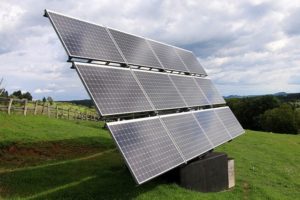As a homeowner, do you also need to own your solar panels? If the upfront costs of owning your own solar installation is a barrier for you, there are several other ways to bring solar energy to your household. A Solar Purchase Agreement, or PPA, allows someone else to rent you a power. A solar lease allows some to rent you the panels. Finally, community solar costs you far less than solar installation by allowing you to share the expenses with neighboring homes.
If going solar is on your wishlist but you don’t know how to make it happen, a Solar Purchase Agreement or one of these other cost-smart solutions could be your way in to keeping going solar costs affordable.
Solar Purchase Agreement
 If you have a Solar Purchase Agreement or Solar PPA, you don’t need to buy your own solar power system. This arrangement also won’t give you the same kinds of long term financial benefits that owning your own panels would. But a Solar Purchase Agreement will allow you the significant environmental benefits of a solar panel carbon footprint with none of the upfront expenses.
If you have a Solar Purchase Agreement or Solar PPA, you don’t need to buy your own solar power system. This arrangement also won’t give you the same kinds of long term financial benefits that owning your own panels would. But a Solar Purchase Agreement will allow you the significant environmental benefits of a solar panel carbon footprint with none of the upfront expenses.
In a Solar Purchase Agreement, someone else owns, installs, and maintains the solar panels on your home.[1] Clean Energy States Alliance They’ll sell you the energy you use by the kilowatt, similarly to a traditional energy provider. But if helping the environment is a priority for you, it’s a great sustainable energy alternative.
Leasing Solar
Leasing is another way to get solar without the upfront costs of buying or paying for installation. It’s very similar to renting a car. The typical solar lease has a fixed fee every month, plus a charge per watt your home uses. The company you lease from will install the solar panels on your home, but you won’t have to pay for installation or maintenance. Like a Solar Purchase Agreement, leasing won’t give you the same kinds of big savings that owning your own solar will. But a solar lease is another way to make your household’s energy use more sustainable.
Community Solar Costs Less
 Like leasing and PPAs, community solar costs less than installing and fully owning your own panels. But in this situation, you’ll co-own solar panels with nearby homeowners or local partners. Everyone shares the clean energy produced by the solar system, but community solar can take a lot of different forms. Neighbors in apartments might share a set of roof panels. Or an entire block could link their solar panels for a more stable energy system. Solar alternatives such as these might be organized by individuals, or by non-profit organizations and entrepreneurs.[2]US Department of Energy Maybe you’ll start a community solar project yourself!
Like leasing and PPAs, community solar costs less than installing and fully owning your own panels. But in this situation, you’ll co-own solar panels with nearby homeowners or local partners. Everyone shares the clean energy produced by the solar system, but community solar can take a lot of different forms. Neighbors in apartments might share a set of roof panels. Or an entire block could link their solar panels for a more stable energy system. Solar alternatives such as these might be organized by individuals, or by non-profit organizations and entrepreneurs.[2]US Department of Energy Maybe you’ll start a community solar project yourself!
Before you choose any of these alternatives, though, educate yourself on how to keep installation expenses low and cut your going solar costs . Between tax credits and rebates, loans, and smart comparison shopping, solar panel ownership might be more accessible than you’d imagine!
(Illustration: solar by Nhor)
References
| ↑1 | Clean Energy States Alliance |
|---|---|
| ↑2 | US Department of Energy |
